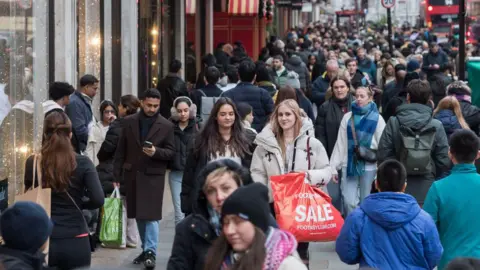Firms plan job cuts as employment costs rise
 Getty Images
Getty ImagesCompanies are planning to cut jobs or recruit fewer people ahead of rises to National Insurance payments and wages, according to a survey of UK employers.
Businesses questioned by the Chartered Institute of Personnel and Development (CIPD) also said they would raise their prices to cover increasing employment costs.
Separate research conducted by the Federation of Small Business found that in the final three months of last year confidence among small firms hit its lowest point for 10 years, not including the Covid pandemic.
The Treasury said it was delivering the stability businesses need to invest and grow.
Rises to National Insurance Contributions (NICs) by employers as well as an increase in the National Minimum Wage, announced in October's Budget, will come into force in April.
According to the CIPD survey, just over a third of the 2,000 firms it spoke to said they planned to reduce their headcount through redundancies or by recruiting fewer workers.
More companies, some 42%, said they would lift prices, while a quarter of those surveyed said "they are cancelling or scaling down plans for investing in or expanding their business".
The findings come ahead of the latest official employment figures which are due to be published on Tuesday.
Peter Cheese, chief executive of the CIPD, said these were the "most significant downward changes in employer sentiment we've seen in the last 10 years, outside of the pandemic".
"It's the everyday economy sectors, such as retail and hospitality, which employ large numbers of people, that will be particularly affected by impending increases to employment costs."
The Federation of Small Business said confidence was falling across a wide range of sectors.
Its small business index, which measures levels of confidence among firms, found small companies "are braced for a contraction in the size of their business in the first three months of 2025".
These latest warnings join a growing chorus of complaints about the planned increases in NICs and the National Minimum Wage.
Last month, the British Chambers of Commerce (BCC) said a survey of almost 5,000 members suggested that confidence had "slumped" to its lowest level for two years.
In November, a group of the biggest retailers in the UK warned that High Street job losses were "inevitable", prices would rise and shops would close because of tax rises in the Budget and other rising costs.
However, some have argued that some of these retailers make bumper profits and can afford the tax increase.
Next made over £1bn in profit last year, and is expected to repeat that. In an interview with the BBC, Next's boss Lord Wolfson accepted that companies like his were the "broad shoulders" that the chancellor insisted must bear the brunt of tax rises needed to rebuild public services.
'Difficult decisions'
From April, employers will have to pay National Insurance at 15% on salaries above £5,000, instead of 13.8% on salaries above £9,100 at the moment.
The government has said the rise is necessary to fund public services and fix a "black hole" in public spending plans. it claims it inherited from the Conservatives.
The Treasury told the BBC it had delivered a "once-in-a-Parliament budget to wipe the slate clean and deliver the stability businesses need to invest and grow, while protecting working people's payslips from higher taxes, ensuring more than half of employers either see a cut or no change in their National Insurance bills, and delivering a record pay boost for millions of workers".
Chancellor Rachel Reeves has consistently defended her Budget, acknowledging she had made "difficult decisions" but that they were "the right decisions in the national interest".
But it has led to a political row, with opposition parties arguing it will dent future economic growth and make companies less likely to hire workers.
The most recent figures from the Office for National Statistics (ONS), estimated that the UK unemployment rate edged up from 4.3% to 4.4% in November.
The latest picture of the jobs market will be revealed on Tuesday. However, the ONS has advised treating its recent figures with "caution", because of low response rates to its employment survey.
 Getty Images
Getty ImagesThe latest inflation figures - which measure the pace of price rises - are due to be published on Wednesday.
In the 12 months to December, prices rose by 2.5%, a slightly smaller increase than in November, but still above the Bank of England's target.
If firms do raise prices in the face of increased employment costs, there is a risk it could feed through to further increases in inflation in the coming months.
The Bank has previously warned it expects inflation to spike at 3.7% later this year and take longer to fall back to its 2% target.
However, on Monday, the Bank of England's governor said inflation was gradually slowing.
Andrew Bailey told business news website BusinessLive: "We still see the gradual disinflation going on. The after-effects of what happened two or three years ago are wearing off, but it is a gradual process."
Despite the expected rise in inflation later this year, Mr Bailey said it did not appear likely to persist longer term.
